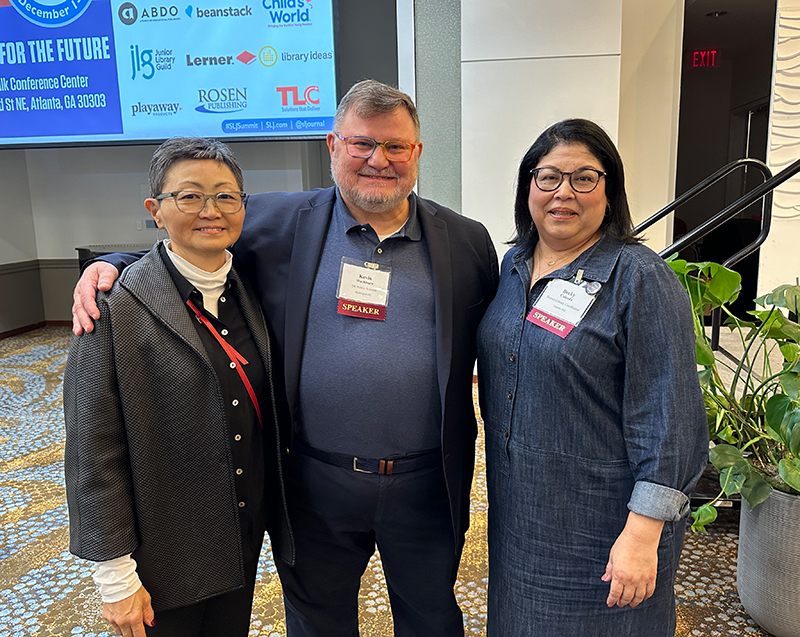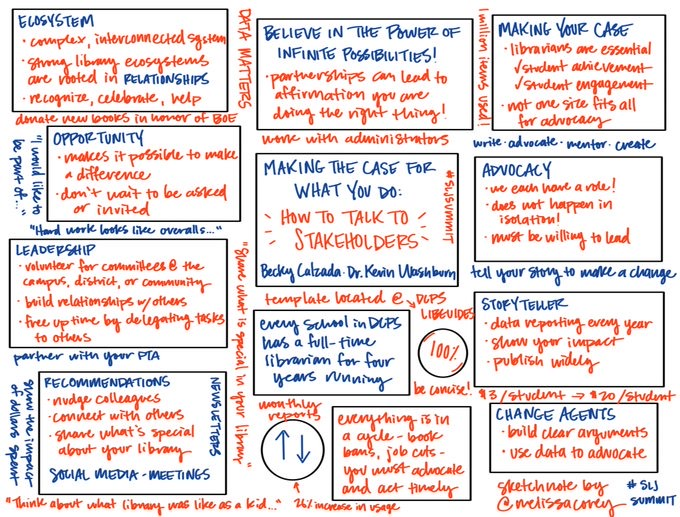Making the Case For What You Do: How to Talk to Stakeholders | SLJ Summit 2023
At the SLJ Summit in Atlanta, Texas district library coordinator Becky Calzada and DC Public Schools director of library programs Kevin Washburn shared ideas and tips for talking to stakeholders and led a workshop for attendees to brainstorm the best ways to get the library message out.
 |
From left: SLJ editor in chief Kathy Ishizuka with SLJ Summit presenters Kevin Washburn and Becky Calzada |
It is so important to get the message out about what school libraries and librarians do and the impact they have. In their SLJ Summit session, “Making the Case for What You Do: How to Talk to Shareholders,” Becky Calzada, district library coordinator
of Leander (TX) ISD, and Kevin M. Washburn, director of library programs for DC Public Schools, shared ideas and resources. Following their Dec. 2 presentation at the Loudermilk Conference Center in Atlanta, attendees participated in a workshop discussion. Here are just some of the tips and ideas that came out of those sessions.
Break yourself and others out of isolation
When Washburn arrived in DC, he found himself in a very different environment from the one he left in Charlotte, N.C. He had to learn about the community and lean on those around him who knew the landscape and stakeholders. He had to branch out, look at the bigger picture, and create relationships to do his job.
“I had to do is draw myself out of this place of isolation,” he said, adding that many librarians need to do the same.
“You know this type of librarian,” he said. “They want to do their job. They want to build capacity. They want to be successful. ‘I've got my thing, and I'm doing it. I care, but I'm only going to go so far.’ They're working in isolation, and that's a problem.
“We have got to spark that passion within them, to get them to move beyond working in silos, and see that they must participate beyond the single entity, have a voice, talk to people, even within their school community, tell their stories because that's where the change will happen.”
Cultivate relationships
It doesn’t always take a lot of time and effort. In some cases, it’s just a quick note.
When Leander, ISD, gets a new school board member, the librarians in the district send them a note. “Welcome to Leander ISD. We're so honored to have you on our school board. Thank you for your service.” Each school’s librarian signs it.
“It sets the tone for the relationship,” said Calzada.
In addition to reaching out to school board members and administrators, create and develop relationships with area public libraires, town and city council members, Rotary Club, local education foundations, the Parent Teacher Association or Home School Association, and parent volunteers. That connection sets them up to share your library’s story in their conversations and more official communications like newsletters. It also creates partners who reach out when issues come up that should involve the library and fight for you when needed.
[READ: Jeff Kinney: Librarians Are the Beating Hearts of the Communities They Serve | SLJ Summit 2023]
Invite people in
No one is just going to stop by to see what’s happening in the library. Actively invite administrators, local legislators, and community members to see what’s happening. Calzada shared an example of the impact that can have after she visited the opening of a new district campus with members of the city council.
“Before we entered the new library space, I had everybody pause outside and said, ‘I want you to close your eyes and think about what the library was like when you were a kid.’”
The older people in attendance remembered their spaces as quiet and dark. Then Calzada told them to go in and pay attention to what they say because they would talk about it after.
“That was such a powerful experience for them,” she said. “And it never left them.”
Because of that visit, a city commissioner went to Calzada later and asked how to partner to get kids access to public libraries. These moments resonate with people and lead to future action.
 |
2023 School Librarian of the Year Finalist Melissa Corey created this sketchnote as she listened to the session. |
Seek opportunities/participate on committees
“We can't wait for the administrator to come to visit our libraries,” said Calzada. “And we can't wait to be invited into a committee.”
Don’t say “Can I come to that meeting?” Calzada said. Instead, ask what time the meeting is and be there.
“If we don't explicitly seek out these entry points where we can support that door to the opportunities never going to open,” she said. “And those opportunities allow us to amplify the narrative and change the narrative of what people think about our libraries.”
[READ: Empowered in the Fight for Intellectual Freedom | SLJ Summit 2023]
Collect and share data
Pulling together the data can take time, but it is well worth it, Calzada and Washburn said.
Washburn shared his libguide for data reporting for school librarians.
Data can be used to advocate and advance the school library narrative. It shows what you need, as well as what you have achieved.
Share the numbers for money per student, books per student, age of the collection, gaps in the collection. Show parents, PTA, and stakeholders who want kids to have the needed resources and will make the argument for you. Later, you can show the impact of improving those numbers thanks to the stakeholders' help.
Templates (provided here for various platforms thanks to the Summit attendees' crowd-sourced document) can help organize a one-page sheet of information that tells the story of your library and your work in easy-to-see numbers—students served, books checked out, classroom visits, teacher collaborations, Chromebooks fixed, and more, based on the specific needs and work in the school. These end-of-the-year reports clearly show the impact.
Nudge others
“I love to nudge people into things because I also believe that many of us don't see the possibility of the things that we can do,” said Calzada.
When she meets someone, she thinks about how and where they can best influence others and suggests specific opportunities that fit their personalities and skills.
“Our colleagues need just a little bit of a gentle push,” she said. “Those nudges can encourage them to connect and volunteer in and outside of their libraries. I also nudge people to connect with others.… We have to talk to others beyond our circle.”
[READ: Jeff Kinney Discusses the Books That Shaped His Childhood and Opened His Mind | SLJ Summit 2023]
Remember balance
You can’t do it all, and it is not helpful to try. Use time wisely. Share the responsibilities of reaching out to stakeholders. Nudge. And amid the censorship battles, staffing issues, and budget struggles, remember to share the joy and special things occurring in school libraries every day.
“There are so many amazing things happening,” said Calzada. “We've got to tell that story.”
RELATED
The job outlook in 2030: Librarians will be in demand
The job outlook in 2030: Librarians will be in demand
ALREADY A SUBSCRIBER? LOG IN
We are currently offering this content for free. Sign up now to activate your personal profile, where you can save articles for future viewing






Add Comment :-
Be the first reader to comment.
Comment Policy:
Comment should not be empty !!!